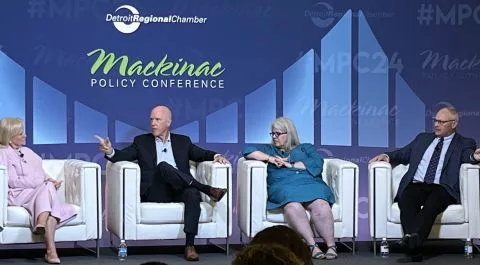Chinese automobile manufacturers have set their sights on global dominance and are expanding their market well beyond — and up to — U.S. borders. At the same time, China is still supplying much of the technology and raw materials used vehicles produced in the U.S., including electric vehicles.
Related:
“We cannot rely on China, folks,” said U.S. Rep. Pete Stauber, R- Minn., chair of the Energy and Natural Resources Committee.
“COVID taught us a lot. If you depend on foreign adversarial nations for our critical minerals (for EV batteries), we are in trouble,” Stauber said to applause from the crowd attending the event organized by MichAUTO, a statewide auto advocacy group.
The discussion of U.S. competitiveness also included U.S. Rep. Debbie Dingell, D-Michigan; Michael Dunne, CEO of Dunne Insights LLC; and Kristin Dziczek, policy advisor for the Federal Reserve Bank of Chicago – Detroit Branch.
“China’s playbook is simple, straightforward and powerful,” Dunne said. “They identify an industry, and they throw all of the national resources at it.”
That’s happened with solar panels, a market now 90% controlled by China, Dunne said. China has also targeted areas like shipbuilding and steel manufacturing, illustrating how the economic issues dovetail with national security concerns.
The Chinese growth in EVs has leapt forward, Dunne said. Examples include:
- China today has the capacity to supply half of the world’s demand for cars
- China will build 30 million vehicles this year, three times the U.S. total
- They’re the number one exporter of vehicles globally, surpassing Japan in 2023
Further, China is the top supplier of vehicles to Mexico, Dunne said, selling 20 different brands. Among them: Chevrolets built by General Motors in China and then shipped to Mexico.
The issue is not just EVs, Dziczek said, since one in five cars sold in Mexico is Chinese built — not EVs but autos with internal-combustion engines (ICE).
As a result, she said, the Chinese also continue to invest in advanced ICE technology so they can meet all auto demand.
Still, when it comes to EVs, China’s rise comes as U.S. auto manufacturers are racing to stake their ground by investing in battery production, manufacturing plants and EV research and development.
American consumers so far are not embracing the vehicles as quickly as once projected. EV sales this year are declining after slower-than-expected growth at the end of 2023. As of April, EVs represent about 7.1% of the overall auto market this year — down from 7.6% a year earlier.
The figures are prompting automakers to continue traditional auto production and look at hybrids, adding pressure on their cash outlays and investment strategies.
Still, Dingell said, “Michigan is competing in a global marketplace. If we are not moving to EVs, we are not going to be competitive.”
Michigan-based Ford Motor Co. and General Motors retreated from global markets over the past 10 years, including Europe and Japan, Dunne said. They also tailored their models to high-profit vehicles.
“Ultimately what we have here is two companies that are very good at making large trucks and SUVs for North American consumers,” Dunne said. “We’re not competitive outside of that market.”
In contrast, China maximized resources behind developing EVs, Dunne said, and “today we are confronted with a machine out of China the likes of which we’ve never seen before.”
Here in the U.S., the political polarization of EVs and environmental issues may hold back progress, panelists warned.
“Sometimes environmental issues get more political than they should be,” Dingell said.
Former President Donald Trump, the expected Republican nominee for this year’s presidential election, has promised to reverse pro-EV policies. Biden, the presumed Democratic nominee, is balancing mining and strongly pro-environmental policy.
The result has been enough bans and restrictions that some warn the U.S. will not be able to supply all of the needed battery and auto components.
One issue to solve, panelists said, is developing more U.S.-based sources for minerals like copper, nickel and taconite, which is mined and processed into iron ore to make steel.
“Some want mining stopped at any cost,” said Stauber, noting that the raw materials feed American production.





